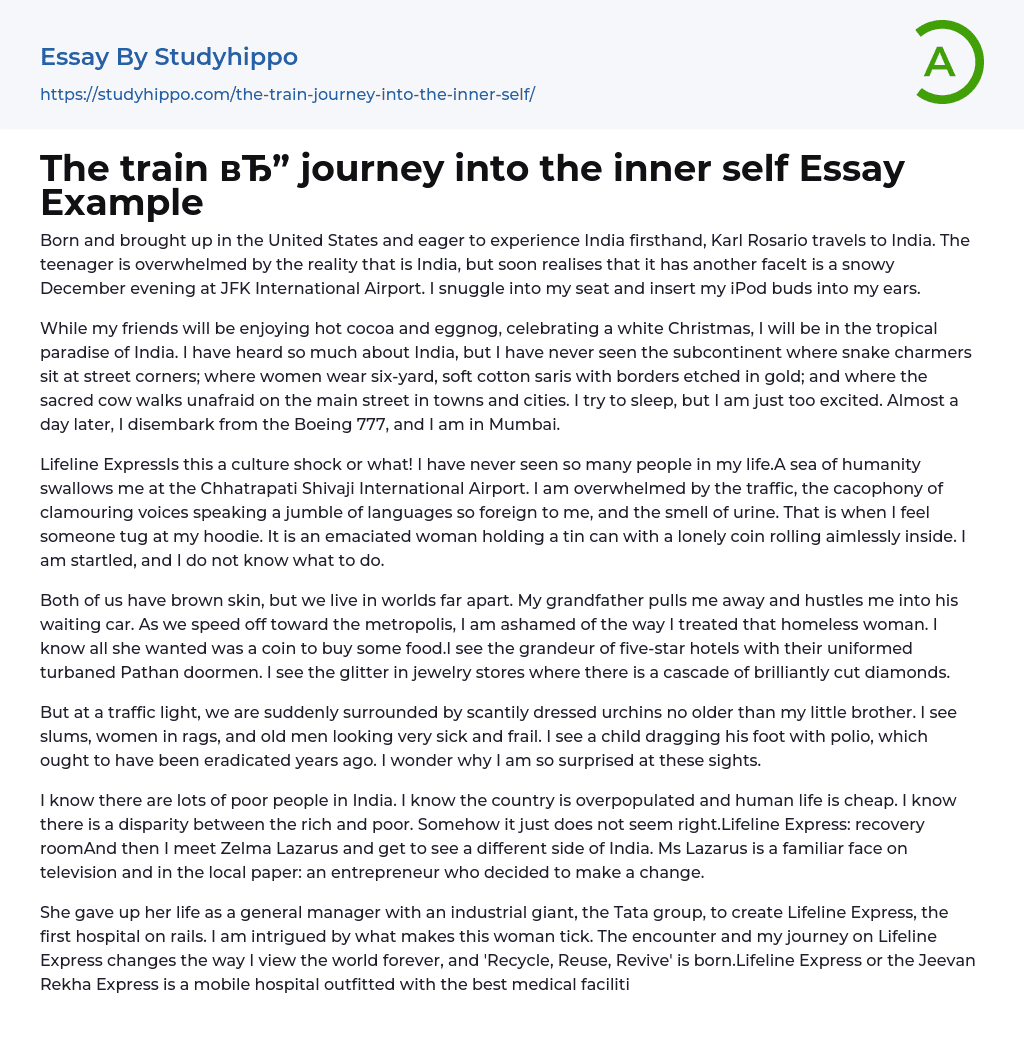Born and brought up in the United States and eager to experience India firsthand, Karl Rosario travels to India. The teenager is overwhelmed by the reality that is India, but soon realises that it has another faceIt is a snowy December evening at JFK International Airport. I snuggle into my seat and insert my iPod buds into my ears.
While my friends will be enjoying hot cocoa and eggnog, celebrating a white Christmas, I will be in the tropical paradise of India. I have heard so much about India, but I have never seen the subcontinent where snake charmers sit at street corners; where women wear six-yard, soft cotton saris with borders etched in gold; and where the sacred cow walks unafraid on the main street in towns and cities. I try to sl
...eep, but I am just too excited. Almost a day later, I disembark from the Boeing 777, and I am in Mumbai.
Lifeline ExpressIs this a culture shock or what! I have never seen so many people in my life.A sea of humanity swallows me at the Chhatrapati Shivaji International Airport. I am overwhelmed by the traffic, the cacophony of clamouring voices speaking a jumble of languages so foreign to me, and the smell of urine. That is when I feel someone tug at my hoodie. It is an emaciated woman holding a tin can with a lonely coin rolling aimlessly inside. I am startled, and I do not know what to do.
Both of us have brown skin, but we live in worlds far apart. My grandfather pulls me away and hustles me into his waiting car. As we speed off towar
the metropolis, I am ashamed of the way I treated that homeless woman. I know all she wanted was a coin to buy some food.I see the grandeur of five-star hotels with their uniformed turbaned Pathan doormen. I see the glitter in jewelry stores where there is a cascade of brilliantly cut diamonds.
But at a traffic light, we are suddenly surrounded by scantily dressed urchins no older than my little brother. I see slums, women in rags, and old men looking very sick and frail. I see a child dragging his foot with polio, which ought to have been eradicated years ago. I wonder why I am so surprised at these sights.
I know there are lots of poor people in India. I know the country is overpopulated and human life is cheap. I know there is a disparity between the rich and poor. Somehow it just does not seem right.Lifeline Express: recovery roomAnd then I meet Zelma Lazarus and get to see a different side of India. Ms Lazarus is a familiar face on television and in the local paper: an entrepreneur who decided to make a change.
She gave up her life as a general manager with an industrial giant, the Tata group, to create Lifeline Express, the first hospital on rails. I am intrigued by what makes this woman tick. The encounter and my journey on Lifeline Express changes the way I view the world forever, and 'Recycle, Reuse, Revive' is born.Lifeline Express or the Jeevan Rekha Express is a mobile hospital outfitted with the best medical facilities and managed by Impact India Foundation (CEO, Zelma Lazarus). The train has specially
designed air-conditioned coaches, surgical operation theatres, gleaming industrial autoclaves, a changing room, a sterilizing room, patient wards, on-board power generators, a pantry car, a storeroom for medical provisions, a lecture room and lodging for medical staff.
Lifeline Express: auditoriumThe train provides diagnostic, medical and surgical treatment to the populace in remote parts of India that lack medical facilities. The Jeevan Rekha Express is also put to service in areas affected by natural disasters. It stays at a place for a few days whilst the natives avail of medical care.A couple of months later, as I volunteer at Mercy Hospital, I see a nurse sort out medical equipment.
Instruments she bags will later be discarded and replaced with new sets. Scissors, forceps and endoscopes head for the medical graveyard. After getting the proper permission, I salvage this waste; and soon my basement transforms from a weekend hang-out to an equipment storeroom where I sort, pack, and prepare an inventory. Soon, eight cartons are ready for shipment.
Lifeline Express: medical facilitiesThen I hit a brick wall. No one is willing to carry these cartons to India. Friends baulk at the prospect. Couriers quote exorbitant rates.
Even my dad, fearing customs officials at Mumbai, refuses to take them along. For a while the cartons sit in the basement. Finally, a chance call to AmeriCares, an international relief agency, sets the ball rolling again. Their volunteers carry the packages to India.
I am delighted when Ms Lazarus e-mails me and tells me that the equipment is on the train, being used to provide medical care to the poorest of the poor. The farmer in Sundarbans has his goiter removed. The housewife
in the tea gardens in Assam gets rid of her kidney stones. And a baby with a cleft lip smiles again.Lifeline Express: operation theatreAs I drive over the Sewickley Bridge on my way to school, I look down the railroad tracks. They remind me of the Lifeline Express as it chugs through the heartland of India, reaching distant villages and bringing state-of-the-art medical care that has not been seen before.
I believe change can happen. And will happen. Recycle, Reuse, Revive has since gone on and done other things in Haiti, Honduras, Argentina, Kenya and Uganda, but the homeless woman who tugged on my hoodie will always haunt me. I wish I had dropped a coin into her tin can that night.
It is that picture of her that inspires me to go on.




